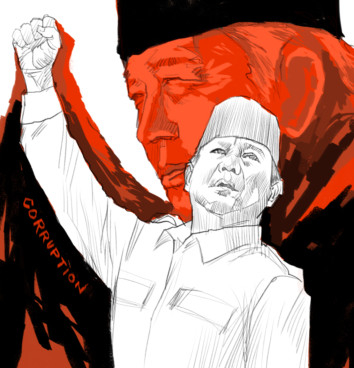
Indonesia’s election next month was supposed to be a progressive turning point: one reformer passing the baton to another, and promising to lift south-east Asia’s biggest economy. Instead, it’s looking like a march backward in ways that should worry investors and world leaders alike.
I’m not endorsing a successor to President Susilo Bambang Yudhoyono ahead of the July 9 contest. But it’s breathtaking to see favourite Joko Widodo blow a race that was his to lose. A month ago, the 53-year-old Jakarta governor was way ahead in the polls and inspiring his youthful nation of 250 million people (26 per cent of whom are under 15) with all the flair of Barack Obama circa 2008. His pledges to reduce red tape, attack corruption, strengthen Indonesia’s finances and move it further away from the bad old Suharto era resonated far and wide.
Now, Widodo is running for his political life as Suharto acolyte Prabowo Subianto gains ground. Suharto, of course, was the dictator who in his 32 years in power turned Indonesia into the kleptocary it was until things crashed in 1997 (he was ousted a year later). In 2004, Yudhoyono became president, transforming Indonesia into a stable, vibrant and investment-grade democracy. That’s why the election of a man once in Suharto’s orbit could be troubling.
Subianto’s father, Sumitro Djojohadikusumo, served as Suharto’s trade minister in the late 1960s and early 1970s and mentored the so-called Berkeley Mafia. That was the spirited band of economists sent to study at the California university in the mid-1960s and who later returned to deregulate and modernise the economy. In the end, their laissez-faire policies were no match for Suharto’s endemic cronyism. Still, the close ties cleared the way for Subianto, who married Suharto’s daughter in 1983 (they later divorced) and rose to become general of the country’s special forces arm.
That military service is now baggage that Subianto carries into the election. The 62-year-old is plagued by allegations of human rights abuses amid the unrest that unseated his former father-in-law. British journalist Richard Lloyd Parry said it all with the title of 2005 chronicling Suharto’s downfall: ‘In the Time of Madness’. These days, the world should be wary of another kind of madness — such as returning to any economic policy smacking of the Suharto era.
Subianto is playing the strongman card with fiery nationalistic speeches. His desire to increase the nation’s borrowing significantly, reconsider trade deals, restrict foreign investment in banks and raise taxes on mining will undo some of the impressive progress Indonesia made since that mad time when many fear it was headed toward failed statehood.
None of these steps will necessarily kill Indonesia’s future. Its economic inertia is powerful enough to overcome a few bad policies. But can a nation where 43 per cent of the people survived on less than $2 (Dh7.34) a day as of the start of 2012 afford such self-inflicted wounds?
Indonesia should be accelerating improvements in governance and curbing the chronic graft that places it behind Egypt and Kosovo on Transparency International’s corruption perceptions index. It must work faster to build roads, bridges, ports and power grids to take advantage of spillovers from China’s growth. That requires hundreds of billions of dollars of investment Indonesia might not get if it turns back the economic clock. It must continue the process of creating strong and independent institutions so that a flawed leader can’t squander a decade of policy upgrades. Here, think coup-happy Thailand.
Unfortunately, Subianto’s surge has Widodo ratcheting up the protectionist rhetoric. Let’s hope it’s just election-year pandering that he will leave at the presidential-palace door should he win next month. But from my own contacts in Jakarta, I get the impression the momentum is very much on Subianto’s side. Investors should at least start examining how that might change the calculus in Jakarta.
The choice for voters is a stark one. Widodo, a soft-spoken political outsider of simple origins, runs Jakarta like a community organiser. He often shows up in troubled neighbourhoods unannounced and entourage-free to settle disputes and fix problems. Subianto hails from political aristocracy and wears the establishment-candidate label with bombastic gusto. He struck a chord with struggling Indonesians who fear their nation’s enviable store of natural resources is being exploited by multinational companies. Subianto rarely misses a chance to deride “foreign lackeys” plundering Indonesia. His campaign even had to ask supporters to pull-down a video using Nazi imagery.
Subianto has the support of tycoons like his brother, Hashim Djojohadikusumo. The question, of course, is what quid pro quos these free-spending allies might expect from a President Subianto. Maybe he’s as straight as they come and will be an inspired leader of the fourth-most populous nation. But those who took for granted that a Widodo administration would soon be building on Yudhoyono’s gains need to begin entertaining a very different scenario for Indonesia.
— Washington Post
William Pesek is a Bloomberg View columnist based in Tokyo. Follow him on Twitter at @williampesek.









